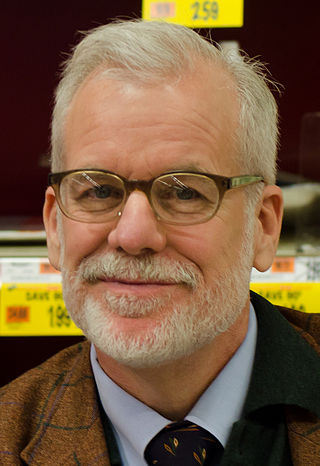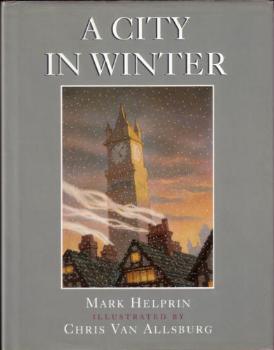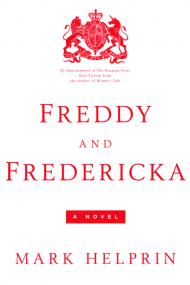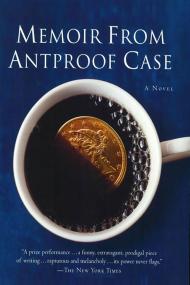Novels, short stories and periodicals
Helprin states that his literary creation "always starts with something very small". "I can sit down to write a story just by thinking of the first two words of a Scott Fitzgerald story: 'This Jonquil'—it's a woman's name. This always gets me in the mood to write. We create nothing new—no one has ever imagined a new color—so what you are doing is revitalizing. You are remembering, then combining, altering. Artists who think they're creating new worlds are simply creating tiny versions of this world." His inspirations include Dante, Shakespeare, Melville and Mark Twain. [2]
His first novel, published in 1977, was Refiner's Fire: The Life and Adventures of Marshall Pearl, a Foundling . The 1983 novel Winter's Tale is a sometimes fantastic tale of early 20th century life in New York City. He published A Soldier of the Great War in 1991. Memoir from Antproof Case , published in 1995, includes long comic diatribes against the effects of coffee. Helprin published Freddy and Fredericka , a satire based on Prince Charles and Princess Diana, in 2005. In Sunlight and In Shadow was released in 2012, and has been described as an extended love song to New York City. [4] Paris In The Present Tense was published in 2017.
Helprin has published three books of short stories: A Dove of the East & Other Stories (1975), Ellis Island & Other Stories (1981), and The Pacific and Other Stories (2004). He has written three children's books, all of which are illustrated by Chris Van Allsburg: Swan Lake , A City in Winter , and The Veil of Snows . His works have been translated into more than a dozen languages.
Helprin's writing has appeared in The New Yorker for two decades. He writes essays and a column for the Claremont Review of Books . His writings, including political op-eds, have appeared in The Wall Street Journal (for which he was a contributing editor until 2006), The New York Times , The Washington Post , the Los Angeles Times , The Atlantic Monthly, The New Criterion , National Review , American Heritage , and other publications.
Controversy
A 16 October 1992 article in The Wall Street Journal by Helprin is entitled "I Dodged the Draft and I Was Wrong". Adapted from a speech he had given at West Point, he said his poor eyesight made him ineligible for service in the US military, but was no impediment to fighting in the Israeli Defense Force. [5]
Helprin wrote an op-ed published in the May 20, 2007 issue of The New York Times, in which he argued that intellectual property rights should be assigned to an author or artist as far as Congress could practically extend them. [6] The overwhelmingly negative response to his position in the blogosphere and elsewhere was reported on The New York Times's blog the next day. [7] Helprin was said to be shocked by the response. [8]
In April 2009, HarperCollins published Helprin's "writer's manifesto", Digital Barbarism. In May, Lawrence Lessig penned a review of the book entitled "The Solipsist and the Internet" in which he described the book as a response to the "digital putdown" heaped upon Helprin's New York Times op-ed. [9] Lessig called Helprin's writing "insanely sloppy" [10] and also criticized HarperCollins for publishing a book "riddled with the most basic errors of fact." [9]
In response to such criticisms, Helprin wrote a long defense of his book in the September 21, 2009 edition of National Review, which concluded: "Digital Barbarism is not as much a defense of copyright as it is an attack upon a distortion of culture that has become a false savior in an age of many false saviors. Despite its lack of mechanical perfections, humanity, as stumbling and awkward as it is, is far superior to the machine. It always has been and always will be, and this conviction must never be surrendered. But surrender these days is incremental, seems painless, and comes so quietly that warnings are drowned in silence." [11]

Lester Lawrence "Larry" Lessig III is an American legal scholar and political activist. He is the Roy L. Furman Professor of Law at Harvard Law School and the former director of the Edmond J. Safra Center for Ethics at Harvard University. He is the founder of Creative Commons and of Equal Citizens. Lessig was a candidate for the Democratic Party's nomination for president of the United States in the 2016 U.S. presidential election but withdrew before the primaries.

Chris Van Allsburg is an American writer and illustrator of children's books. He has won two Caldecott Medals for U.S. picture book illustration, for Jumanji (1981) and The Polar Express (1985), both of which he also wrote, and were later adapted as successful motion pictures. He was also a Caldecott runner-up in 1980 for The Garden of Abdul Gasazi. For his contribution as a children's illustrator, he was a 1986 U.S. nominee for the biennial International Hans Christian Andersen Award, the highest international recognition for creators of children's books. He received the honorary degree of Doctor of Humane Letters from the University of Michigan in April 2012.

Free Culture: How Big Media Uses Technology and the Law to Lock Down Culture and Control Creativity is a 2004 book by law professor Lawrence Lessig that was released on the Internet under the Creative Commons Attribution/Non-commercial license on March 25, 2004.
Permission culture is a term often employed by Lawrence Lessig and other copyright activists such as Luis Villa and Nina Paley to describe a society in which copyright restrictions are pervasive and enforced to the extent that any and all uses of copyrighted works need to be explicitly leased. This has both economic and social implications: in such a society, copyright holders could require payment for each use of a work and, perhaps more importantly, permission to make any sort of derivative work.

Alex Alben, American technology executive, author and law professor, served as the first Chief Privacy Officer of Washington State from April 2015 to May 2019. His career spans work for innovative Internet media companies with influential positions in industry groups seeking to create new laws for digital distribution of content. Previously, he was a candidate for the United States House of Representatives in 2004, a campaign which drew national attention because of the high tech district and the media personalities involved in the race, as noted by media coverage in The New York Times, "In a House Campaign With Personality, One Candidate Has the Microphone," June 12, 2004. He ran as a Democrat in the Eighth Congressional District of Washington. Alben is the author of "Analog Days—How Technology Rewrote Our Future," and consults to public sector organizations, high tech and energy companies on privacy and security related matters. He is a Lecturer at the UCLA School of Law, teaching courses on Privacy, Cybersecurity and Internet Law. Artificial Intelligence, Antitrust and speech regulation on social media platforms are the focus of his current research and writing. He is the co-director of THEAIFORUM.ORG and co-founder of Theo Ai, an artificial intelligence company serving the legal field.

Anthony Malcolm Daniels, also known by the pen name Theodore Dalrymple, is a conservative English cultural critic, prison physician and psychiatrist. He worked in a number of Sub-Saharan African countries as well as in the East End of London. Before his retirement in 2005, he worked in City Hospital, Birmingham and Winson Green Prison in inner-city Birmingham, England.
Perpetual copyright, also known as indefinite copyright, is copyright that lasts indefinitely. Perpetual copyright arises either when a copyright has no finite term from outset, or when a copyright's original finite term is perpetually extended. The first of these two scenarios is highly uncommon, as the current laws of all countries with copyright statutes set a standard limit on the duration, based either on the date of creation/publication, or on the date of the creator's death. Exceptions have sometimes been made, however, for unpublished works. Usually, special legislation is required, granting a perpetual copyright to a specific work.

David Friedman, known professionally as David Benioff, is an American writer and producer. Along with his collaborator D. B. Weiss, he is best known for co-creating Game of Thrones (2011–2019), the HBO adaptation of George R. R. Martin's series of books A Song of Ice and Fire. He also wrote 25th Hour (2002), Troy (2004), City of Thieves (2008) and co-wrote X-Men Origins: Wolverine (2009).

Winter's Tale is a 1983 magic realism novel by Mark Helprin. It takes place in a mythic New York City, markedly different from reality, and in an industrial Edwardian era near the turn of the 20th century. Akiva Goldsman wrote a screenplay based on the novel and directed a feature film from the script, which was released in 2014.

Remix culture, also known as read-write culture, is a term describing a culture that allows and encourages the creation of derivative works by combining or editing existing materials. Remix cultures are permissive of efforts to improve upon, change, integrate, or otherwise remix the work of other creators. While combining elements has always been a common practice of artists of all domains throughout human history, the growth of exclusive copyright restrictions in the last several decades limits this practice more and more by the legal chilling effect. In reaction, Harvard law professor Lawrence Lessig, who considers remixing a desirable concept for human creativity, has worked since the early 2000s on a transfer of the remixing concept into the digital age. Lessig founded the Creative Commons in 2001, which released a variety of licenses as tools to promote remix culture, as remixing is legally hindered by the default exclusive copyright regime applied on intellectual property. The remix culture for cultural works is related to and inspired by the earlier Free and open-source software for software movement, which encourages the reuse and remixing of software works.

The free-culture movement is a social movement that promotes the freedom to distribute and modify the creative works of others in the form of free content or open content without compensation to, or the consent of, the work's original creators, by using the Internet and other forms of media.
The Claremont Review of Books (CRB) is a quarterly review of politics and statesmanship published by the conservative Claremont Institute. A typical issue consists of several book reviews and a selection of essays on topics of conservatism and political philosophy, history, and literature. Authors who are regularly featured in the Review are sometimes nicknamed "Claremonsters."

A City in Winter is a novel by American writer Mark Helprin, first published in 1996. Considered a children's novel, it is mixture of war novel and a satire of bureaucracy, telling the story of a 10-year-old queen's quest to regain her throne.

Code and Other Laws of Cyberspace is a 1999 book by Lawrence Lessig on the structure and nature of regulation of the Internet.

Remix: Making Art and Commerce Thrive in the Hybrid Economy is Lawrence Lessig's fifth book. The book was made available for free download and remixing under the CC BY-NC Creative Commons license via Bloomsbury Academic. It is still available via the Internet Archive. It details a hypothesis about the societal effect of the Internet, and how this will affect production and consumption of popular culture to a "remix culture".

Cyber Rights: Defending Free Speech in the Digital Age is a non-fiction book about cyberlaw, written by free speech lawyer Mike Godwin. It was first published in 1998 by Times Books. It was republished in 2003 as a revised edition by The MIT Press. Godwin graduated from the University of Texas School of Law in 1990 and was the first staff counsel for the Electronic Frontier Foundation. Written with a first-person perspective, Cyber Rights offers a background in the legal issues and history pertaining to free speech on the Internet. It documents the author's experiences in defending free speech online, and puts forth the thesis that "the remedy for the abuse of free speech is more speech". Godwin emphasizes that decisions made about the expression of ideas on the Internet affect freedom of speech in other media as well, as granted by the First Amendment to the United States Constitution.

Freddy and Fredericka is a satiric novel by Mark Helprin. The book was initially published on July 7, 2005 by Penguin Press. In an interview, Helprin said that the idea for the story originated while he was in a restaurant in Portland, Oregon, while on book tour with his family to promote A Soldier of the Great War. The restaurant had a window through which patrons could see some people cooking and others washing dishes. One of Helprin's daughters asked if it was the Prince and Princess of Wales, who were in the news at the time, washing dishes.

Freedom of Expression® is a book written by Kembrew McLeod about freedom of speech issues involving concepts of intellectual property. The book was first published in 2005 by Doubleday as Freedom of Expression®: Overzealous Copyright Bozos and Other Enemies of Creativity, and in 2007 by University of Minnesota Press as Freedom of Expression®: Resistance and Repression in the Age of Intellectual Property. The paperback edition includes a foreword by Lawrence Lessig. The author recounts a history of the use of counter-cultural artistry, illegal art, and the use of copyrighted works in art as a form of fair use and creative expression. The book encourages the reader to continue such uses in art and other forms of creative expression.

The 2016 presidential campaign of Lawrence Lessig, a law professor at Harvard University and cofounder of Creative Commons, was formally announced on September 6, 2015, as Lessig confirmed his intentions to run for the Democratic Party's nomination for President of the United States in 2016. Lessig had promised to run if his exploratory committee raised $1 million by Labor Day, which it accomplished one day early. He described his candidacy as a referendum on campaign finance reform and electoral reform legislation.

Memoir From Antproof Case is a book by American writer Mark Helprin. The novel was initially published in April 1995.

















